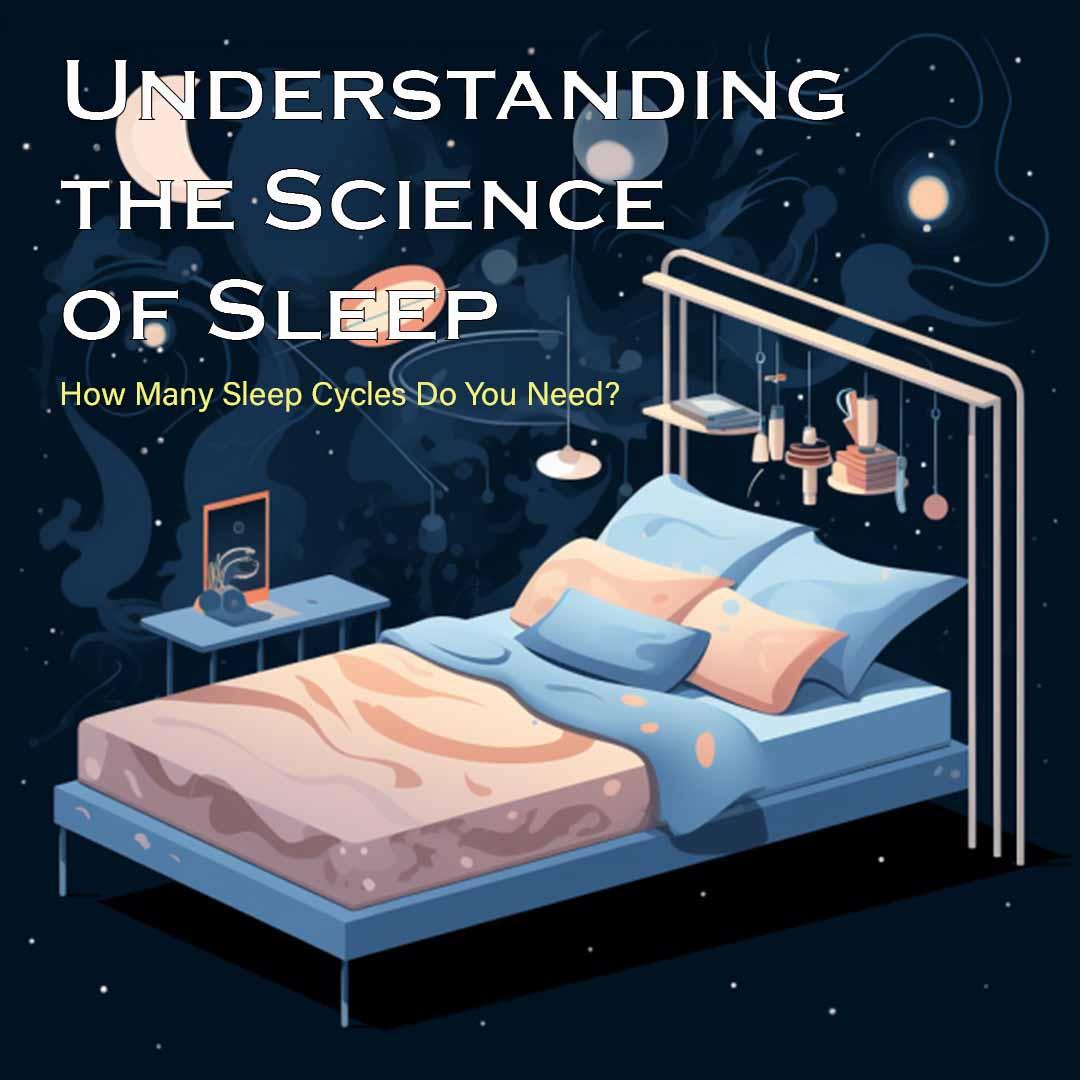Getting a good night's sleep is more than just closing your eyes and waking up refreshed.
Are you tired of tossing and turning at night, struggling to fall asleep or stay asleep? You're not alone. Many of us have experienced the frustration of a restless night, only to wake up feeling groggy and unrefreshed. Sleep plays a crucial role in our overall well-being, affecting our mood, productivity, and overall health. Understanding the science behind our sleep patterns can provide valuable insights into optimizing our sleep and overcoming common sleep challenges like insomnia. In this section, we will delve into the fascinating world of the sleep cycle and its stages, exploring how they impact our sleep quality and offering practical tips to help you achieve a more restful and rejuvenating night's sleep. So, let's dive in and discover the secrets to unlocking the power of a good night's rest.

What is Sleep Cycle and its Stages ?
The sleep cycle consists of several stages that repeat throughout the night, each with its own unique characteristics and purpose. Let's take a closer look at each stage:
Stage 1 - Transition to Sleep:
This is the initial stage when you start to drift off to sleep. Your brain waves slow down, producing alpha and theta waves, and you may experience a relaxed state between wakefulness and sleep. It's like the moment when you're lying in bed, feeling drowsy, and your mind starts to wander before you fully fall asleep.
Stage 2 - Light Sleep:
In this stage, your brain activity further slows down, and your body temperature drops. This is the stage where you spend the majority of your sleep. During light sleep, your body is still responsive to external stimuli, and you may have brief moments of wakefulness. It's like those times when you're easily awakened by a noise outside or a slight disturbance in your surroundings.
Stage 3 - Deep Sleep:
Also known as deep sleep or slow-wave sleep. Deep sleep is the stage where your body and mind rejuvenate and restore themselves. Your brain waves slow down even further, and your muscles relax. It's during deep sleep that your body repairs tissues, strengthens the immune system, and consolidates memories. It's harder to wake up during this stage, and your brain produces slow delta waves. If you've ever had a night of deep, uninterrupted sleep, you wake up feeling refreshed and energized the next day.
REM Sleep - Dream Sleep:
REM (Rapid Eye Movement) sleep is the stage associated with dreaming. Your brain becomes highly active, and your eyes move rapidly. This stage is essential for cognitive function, emotional regulation, and memory consolidation. During REM sleep, your body is temporarily paralyzed to prevent acting out your dreams. It's when you experience vivid and immersive dreams, and if you wake up during this stage, you may recall the details of your dream.

Throughout the night, the sleep cycle repeats several times, with each cycle lasting approximately 90 minutes. Each stage serves a vital purpose in maintaining our physical and mental well-being. Understanding the different stages of the sleep cycle helps us comprehend why we may feel groggy or refreshed upon waking, and it provides insights into optimizing our sleep for a better quality of life.
How Many Sleep Cycles Do You Need?
After going through each stage of the sleep cycle, you might be wondering how many cycles of sleep you typically experience and if it matters. On average, a person goes through about four to six sleep cycles per night, depending on their individual sleep needs and total sleep duration.
Having too many sleep cycles can result in prolonged periods of sleep, making you feel groggy and excessively tired upon waking. On the other hand, having too few sleep cycles may leave you feeling unrefreshed and lacking energy throughout the day.
Which Sleep Stage is Best to Wake Up In?
It's worth noting that waking up during certain stages of the sleep cycle can have different effects on your well-being. If you wake up during lighter stages, such as Stage 1 or Stage 2, you might feel more refreshed and alert. However, if you're abruptly awakened during deep sleep or REM sleep, you may experience sleep inertia, which can cause temporary grogginess and disorientation.
While it's not possible to precisely determine the stage you'll wake up in without specialized monitoring equipment, some sleep tracking devices and apps use algorithms to estimate your sleep cycle and offer a suggested wake-up time within a desired range.
Is Everyone Able to Experience the Full Sleep Cycle?
Achieving quality sleep is not only about having a complete sleep cycle but also ensuring that each stage is experienced fully. However, some individuals may struggle to enter stage 3, also known as deep sleep. This stage is crucial for physical restoration and immune system support. A lack of deep sleep can result in feeling groggy, fatigued, and mentally foggy the next day. It may also lead to difficulties in concentration, memory, and mood regulation.
Several factors can contribute to difficulties in entering this crucial stage and experiencing its benefits. Here are some possible reasons:
- Environmental Factors: Disturbances in the sleep environment, such as noise, light, or an uncomfortable mattress, can disrupt the transition to deeper sleep stages, including stage 3. An unsupportive or uncomfortable mattress can lead to tossing and turning, making it difficult to reach and maintain deep sleep.
- Sleep Disorders: Certain sleep disorders, such as sleep apnea or restless legs syndrome, can interfere with the progression through the sleep stages, including stage 3. These conditions may cause frequent awakenings or disruptions during the night, preventing individuals from experiencing a full sleep cycle.
- Lifestyle Factors: Lifestyle choices, such as excessive caffeine intake, irregular sleep schedule, or high levels of stress, can negatively impact the quality and duration of sleep. These factors may hinder the ability to reach deep sleep and complete the full sleep cycle.
- Uncomfortable mattress: A mattress that lacks proper support or fails to distribute body weight evenly can cause discomfort and prevent deep sleep. Additionally, a mattress that does not provide adequate pressure relief can lead to discomfort and pain, making it challenging to enter deep sleep.
- Partner disturbance: Sharing a bed with a restless partner who moves frequently during sleep can disrupt your sleep cycles, making it difficult to reach deep sleep.
How Many Hours of Sleep Do We Need?
By ensuring a restful and uninterrupted sleep experience, a suitable mattress can contribute to better overall sleep quality, leading to improved health, cognitive function, and well-being.
Shop the "Australia best value mattresses"
However, it's important to remember that sleep quality is just as important, if not more, than sleep quantity. Instead of solely focusing on waking up at a specific stage, it's generally recommended to prioritize getting enough overall sleep and establishing a consistent sleep routine that aligns with your individual needs and preferences.
Scientific research supports the importance of maintaining a regular sleep schedule and aiming for a sufficient duration of sleep, typically around 7-9 hours for adults. By prioritizing both quantity and quality of sleep, you can optimize your restorative sleep and wake up feeling refreshed and rejuvenated.
Prioritizing Both Quantity and Quality of Sleep
By prioritizing both quantity and quality of sleep, you can significantly improve your overall well-being. To help you achieve a more restful and rejuvenating night's sleep, we recommend incorporating the following practical tips into your routine:
- Establishing a Bedtime Routine: Having a consistent bedtime routine can signal to your body that it's time to wind down and prepare for sleep. Consider incorporating relaxing activities such as reading a book, taking a warm bath, or practicing gentle stretching or meditation. For more detailed tips on creating an effective bedtime routine, check out our blog post "Establishing a Bedtime Routine."
- Creating a Sleep-Friendly Environment: Your sleep environment plays a crucial role in promoting quality sleep. Make sure your bedroom is cool, dark, and quiet. Consider investing in comfortable bedding, a supportive mattress, and pillows that suit your preferences. For further guidance on optimizing your sleep environment, explore our blog post "Creating a Sleep-Friendly Environment."
- Managing Stress and Relaxation Techniques: Stress can greatly impact your ability to sleep well. Explore stress management techniques such as deep breathing exercises, progressive muscle relaxation, or mindfulness meditation to help calm your mind and body before bed. Our blog post "Managing Stress and Relaxation Techniques" provides valuable insights and practical tips on incorporating these techniques into your daily routine.
By delving into each of these topics, you can gather more in-depth knowledge and discover additional strategies for enhancing your sleep quality.
Conclusion
In conclusion, understanding the science of sleep and the importance of sleep cycles is crucial for optimizing our sleep quality and overall well-being. While the average adult goes through approximately 4-6 sleep cycles per night, the specific number can vary depending on individual factors. Each sleep cycle consists of different stages, including light sleep, deep sleep, and REM sleep, each serving unique purposes in our physical and mental restoration. By prioritizing both the quantity and quality of sleep, we can aim to achieve a sufficient number of sleep cycles to wake up feeling refreshed and rejuvenated. Establishing a consistent sleep schedule, creating a sleep-friendly environment, and practicing relaxation techniques can contribute to a more restful night's sleep. Remember, quality sleep is essential for optimal health and daily functioning. So, embrace the science of sleep and discover the benefits of a well-rested mind and body.
Remember, prioritizing your sleep is a valuable investment in your overall health and well-being. By adopting healthy sleep habits and making small adjustments to your lifestyle, you can experience the transformative power of a good night's sleep.
More information
To access the comprehensive and detailed "Ultimate Guide to Better Sleep: Tips and Strategies for Restful Nights" eBook or PDF, simply click the link below to download it for free:
Download the Ultimate Guide to Better Sleep: Tips and Strategies for Restful Nights
This comprehensive resource will provide you with even more valuable insights, tips, and strategies for achieving optimal sleep and improving your overall well-being. We encourage you to take advantage of this valuable resource and embark on your journey to better sleep. Sweet dreams await you!
















Leave a comment
All comments are moderated before being published.
This site is protected by hCaptcha and the hCaptcha Privacy Policy and Terms of Service apply.